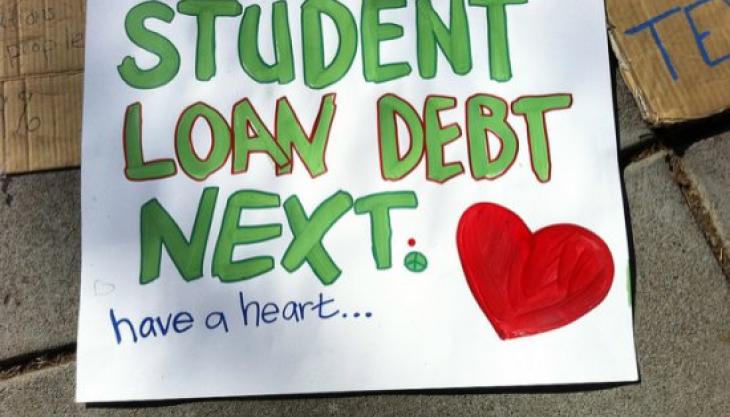What Is Required to Request Student Loan Relief in Bankruptcy?
Submitted by Rachel R on Mon, 08/07/2017 - 10:03am

How student loans may be discharged in bankruptcy
Image Source: ProtestSign08
It’s a myth that student loans cannot be discharged along with other debts in bankruptcy, so long as you meet certain requirements. The foremost requirement is undue hardship. But even if you can prove financial hardship, there is an additional step to take to request the discharge. This step is called an adversary proceeding. Here’s what you should know about this additional process available to North Carolina bankruptcy filers.
What Is an Adversary Proceeding?
Referred to often as “AP,” an adversary proceeding is a separate lawsuit that is filed in correlation to your bankruptcy suit but is not part of your bankruptcy case. It resembles a civil case and is, essentially, you suing your student loan provider for debt relief. The US bankruptcy courts recommend that you use an attorney for this process because of the complexity of the process and the court proceeding required to obtain debt relief from an adversary proceeding.
What Does Undue Hardship Mean?
The standard that federal law requires bankruptcy courts to use to determine whether or not you can get a discharge of your student loans is a tenet called “undue hardship.” That is a phrase from the Federal Code, but it is not defined. Therefore, it has been left up to the courts to interpret the vague phrase. In 1987, a case filed by Marie Brunner seeking student loan relief established what is now known as the “Brunner Test” as Ms. Brunner won her request for discharge of her educational debt but then lost when the lender appealed.
What Is the Brunner Test?
The Brunner test has three prongs that consider:
1 – On your current income and with your current expenses, can you maintain a minimal standard of living for yourself and your dependents if you must keep paying your student loans?
2 – Will this state of affairs of unaffordability persist for most (or all) of the intended repayment period of your student loans?
3 – Have you made a good faith effort to repay your student loans?
If you meet all three tenets of the Brunner test, you may be able to have your student loans discharged in part or in full, whether they are private or federal student loans?
How Often Are Student Loans Discharged in Bankruptcy?
The main obstacle to student loans being discharged in bankruptcy is consumers not requesting discharge. A study by a Harvard Law professor a few years back found that nearly 40% of student loan debtors that request discharge in bankruptcy via adversary proceeding get partial or total relief. While that might not sound like a lot, that’s a lot more success than the myth that says student loans can’t be forgiven in bankruptcy.
Who Is Likely to Get a Student Loan Discharge in Bankruptcy?
The Harvard law professor’s examination of bankruptcy relief for student loans found three prevailing characteristics in those that were able to get discharge more easily. These include unemployment, medical issues, and lower income in the year before filing bankruptcy. In the year of the study, almost 170,000 people with student loans filed bankruptcy yet only 213 of these people asked for student loan relief.
Of those that sought relief, 51 (which equates to 24%), got a full discharge of their loans. Another 30 (or 14%) got a partial discharge of their debt. Also, another 25 (equal to almost 12%) got some type of administrative remedy to assist them. Finally, of those that asked for a discharge, 107 (or 50%) got no form of relief. The problem is that more than 99% of bankruptcy filers with student loans don’t try for discharge, according to the same study.
In many cases, it may be worth the extra time and effort to seek student loan relief while applying for bankruptcy. To find out more about the benefits of bankruptcy and how it can help with educational debt, contact the Law Offices of John T. Orcutt. Call +1-833-627-0115 now for a free North Carolina bankruptcy consultation at one of our locations in Raleigh, Durham, Fayetteville, Wilson, Greensboro or Wilmington.
Resource:
Debts Hurt! Got debt? Need help? Get started below!
Serving All of North Carolina
- Bankruptcy Attorneys Raleigh NC (North)
- Bankruptcy Attorney Fayetteville NC
- Bankruptcy Attorney Durham NC
- Bankruptcy Attorneys Wilson NC
- Bankruptcy Attorneys Greensboro NC
- Bankruptcy Attorneys Southport NC
- Bankruptcy Attorneys Wilmington NC
Bankruptcy Attorneys Raleigh NC (North)
6616 Six Forks Rd #203 Raleigh, NC 27615 North Carolina
Tel: (919) 847-9750

Bankruptcy Attorney Fayetteville NC
2711 Breezewood Ave Fayetteville, NC 28303 North Carolina
Tel: (910) 323-2972

Bankruptcy Attorney Durham NC
1738 Hillandale Rd Suite D Durham, NC 27705 North Carolina
Tel: (919) 286-1695


Bankruptcy Attorneys Greensboro NC
2100 W Cornwallis Dr. STE O Greensboro, NC 27408 North Carolina
Tel: (336) 542-5993

Bankruptcy Attorneys Southport NC
116 N Howe St. Suite A Southport, NC 28461 North Carolina
Tel: (910) 218-8682

Bankruptcy Attorneys Wilmington NC
116 N. Howe Street, Suite A Southport, NC 28461 North Carolina
Tel: (910) 447-2987
